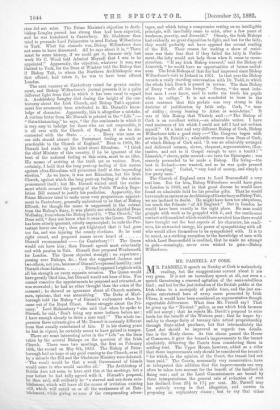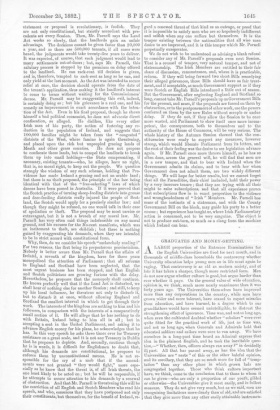MR. PARNELL AT CORK.
MR. PARNELL'S speech on Sunday at Cork is melancholy reading, but the exaggerations current about it are very gross. It is not an incendiary speech at all, nor even a . speech threatening a renewed agitation of the semi-rebellious kind ; and but for the just irritation of the British public at the Irish claim to a monopoly of public time, and the just sus- picion entertained here of every cause promoted by Irish Ultras, it would have been considered an argumentative though regrettable deliverance. What does Mr. Parnell say ? That he gives up the "No-rent" policy, as one which Irish farmers will not accept ; that he rejects Mr. Davitt's proposal to seize lands for the benefit of the Western poor ; that he hopes by- and-by to change fixity of tenancy into actual proprietorship through State-aided purchase, but that intermediately the Land. Act should be improved as regards two details. One is the Healy clause. As this clause passed the House of Commons, it gave the tenant's improvements to the tenant absolutely, debarring the Courts from considering them in settling rent. The Upper House, however, added as a rider that those improvements only should be considered the tenant's "for which, in the opinion of the Court, the tenant had not been paid." The Courts, necessarily very conservative, have so interpreted this addition that the improvements can very often be taken into account for the benefit of the landlord in fixing rent ; and as the Land Commissioners are bound by these interpretations, the general rate of reduction of rent has declined from 23i to 17. per cent. Mr. Parnell may be entirely wrong in that allegation, and unwise in proposing an explanatory clause ; but to say that either
statement or proposal is revolutionary, is foolish. They are not only constitutional, but strictly accordant with pre- cedents set every Session. Then, Mr. Parnell says the Land Act works so slowly, that the landlords gain an unfair advantage. The decisions cannot be given faster than 20,000 a year, and as there are 500,000 tenants, if all cases were heard, the judgments would take twenty-five years to deliver. It was expected, of course, that each judgment would lead to many settlements out-of-doors ; but, says Mr. Parnell, this salutary process is stopped by the premium on delay offered to the landlord. He can rack-rent till decision is given, and is, therefore, tempted to rack-rent as long as he can, and only yield at the last moment. As the Act was intended to secure relief at once, the decision should. operate from the date of the tenant's application, thus making it the landlord's interest to come to terms without waiting for the Commissioners' decree. Mr. Parnell may be exaggerating this evil, indeed, is certainly doing so ; but his grievance is a real one, and his remedy an improvement in exact accordance with the inten- • tion of the Act. Even in his final proposal, though he shows himself a bad political economist, he does not advocate direct confiscation, as alleged. He dislikes, like every other Irish man of his party, the notion of fostering any re- duction in the population of Ireland, and suggests that 100,000 families might be taken from the " congested " districts of the West, where famine is again threatening, and placed upon the rich but unpeopled grazing lands of Meath and other grass counties. He does not propose to confiscate these lands, but to compel the landlords to break them up into small holdings—the State compensating, if necessary, existing tenants—who, he alleges, have no right, that is, no moral right, to keep out the people. We question strongly the wisdom of any such scheme, holding that Pro- vidence has made Ireland a grazing and not an arable land ; but there is no theft proposed, the principle of the law being identical with that of the " free-selecting " laws of which dozens have been passed in Australia. If it were proved that the Scotch practice of turning sheep-feeding districts into grouse and deer-feeding districts really injured the people of Scot- land, the Scotch would apply for a precisely similar law ; and though they might be refused, no one would talk in their case of spoliation or theft. The proposal may be most unwise or extravagant, but it is not a breach of any moral law. Mr. Parnell has very often said things indefensible on any moral ground, and his excuses for the No-rent manifesto, which was an incitement to theft, are childish ; but there is nothing gained by exaggerating his demands, when they are intended to be in strict accord with constitutional form.
Why, then, do we consider his speech "melancholy reading I" For two reasons, the first being its preposterous provincialism. Nobody is better aware than Mr. Parnell that the affairs of Irelattd, a seventh of the kingdom, have for three years monopolised the attention of Parliament ; that all reforms in England and Scotland have been neglected, that the most urgent business hasP been stopped, and that English and Scotch politicians are growing furious with the delay. Nevertheless, he proposes that the monopoly shall continue. He knows perfectly well that if the Land Act is disturbed, we shall hear of nothing else for another Session ; and still, to keep up his local influence, he threatens not only to disturb it, but to disturb it at once, without allowing England and Scotland the smallest interval in which to get through their work. The interests of the kingdom are nothing to him and his followers, in comparison with the interests of a comparatively small section of it. He will allege that he has nothing to do with Britain, Ireland being to him all in all ; but in accepting a seat in the United Parlidment, and asking it to advance English money for his plans, he acknowledges that he has. In this very speech he asks three times over for Treasury assistance on a great scale, and it is not any Treasury in Dublin that lie proposes to deplete. And, secondly, cautious though he is in words, it is difficult for Englishmen to doubt that, although his demands are constitutional, he proposes to enforce them by unconstitutional means. He is not re- sponsible for the cry of a mob that if the amend- ments were not granted "they would fight," more espe- cially as he knew that the threat is, of all Irish threats, the one least likely to be acted on ; but he will be responsible, if he attempts to secure attention to his demands by a renewal of obstruction. And that Mr. Parnell is threatening this will be the conviction of all English and Scotch Members who read his speech, and who, conscious that they have postponed not only their constituents, but themselves, for the benefit of Ireland, re-
gard a renewed threat of that kind as an outrage, or proof that it is impossible to satisfy men who are so hopelessly indifferent and selfish when any one suffers but themselves. It is the temper existing between the nationalities that all wise men desire to see improved, and it is this temper which Mr. Parnell perpetually exasperates.
We do not wish to be understood as advising a blank refusal to consider any of Mr. Parnell's proposals even next Session. That is a counsel of temper, very natural temper, and not of statesmanship. The Irish Members are entitled to their fair share of discussion, remonstrance, and, where it is practicable, reform. If they will bring forward two short Bills remedying their alleged grievances, those Bills should have as fair treat- ment, and if acceptable, as much Government support as if they were Scotch or English Bills introduced a little out of Beason. But the Government, after neglecting England and Scotland so long, cannot take Mr. Parnell's proposals up as Government Bills for the present, and must, if the proposals are forced on them by obstruction, or to the postponement of other work, use the powers conferred on them by the new Rules without scruple or undue delay. If they do not, if they allow the Session to be once more wasted, and Parliament to show itself once more incom- petent, the consequences, both to themselves and to the authority of the House of Commons, will be very serious. The whole history of the Autumn Session showed that the con- stituencies were ready to support any measures, however strong, which would liberate Parliament from its fetters, and the root of their feeling was the desire to see legislation advance again. If Mr. Parnell once more throws himself, as he has so often done, across the general will, he will find that men are in a new temper, and that to bear with Ireland when the Government admits its claims, and to bear with her when Government does not admit them, are two widely different things. We will hope for better results, but we cannot forget that all the Parnellites, their chief included, hold their power by a very insecure tenure ; that they are trying with all their might to raise subscriptions, and that all experience proves that subscriptions flow in in exact proportion to the violence and wrongheadedness of " Irish " Members. Mr. Parnell has some of the instincts of a statesman, and with the County Government Bill on the block, may guide his party to a better course ; but experience has taught us, where Irish Parliamentary action is concerned, not to be very sanguine. The object is not to produce out-turn, so much as a clang from the machine which Ireland can hear.


































 Previous page
Previous page